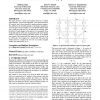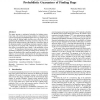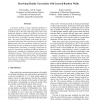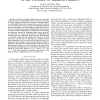1511 search results - page 55 / 303 » On the effectiveness of address-space randomization |
CVPR
2005
IEEE
14 years 9 months ago
2005
IEEE
In [1], three popular subspace face recognition methods, PCA, Bayes, and LDA were analyzed under the same framework and an unified subspace analysis was proposed. However, since t...
DAC
2003
ACM
14 years 8 months ago
2003
ACM
This paper presents a power grid analyzer based on a random walk technique. A linear-time algorithm is first demonstrated for DC analysis, and is then extended to perform transien...
ASPLOS
2010
ACM
14 years 2 months ago
2010
ACM
This paper presents a randomized scheduler for finding concurrency bugs. Like current stress-testing methods, it repeatedly runs a given test program with supplied inputs. Howeve...
ICDM
2009
IEEE
14 years 2 months ago
2009
IEEE
A pervasive problem in large relational databases is identity uncertainty which occurs when multiple entries in a database refer to the same underlying entity in the world. Relati...
ICC
2008
IEEE
14 years 2 months ago
2008
IEEE
—In battery-constrained large-scale sensor networks, nodes are prone to random failures due to various reasons, such as energy depletion and hostile environment. Random failures ...




